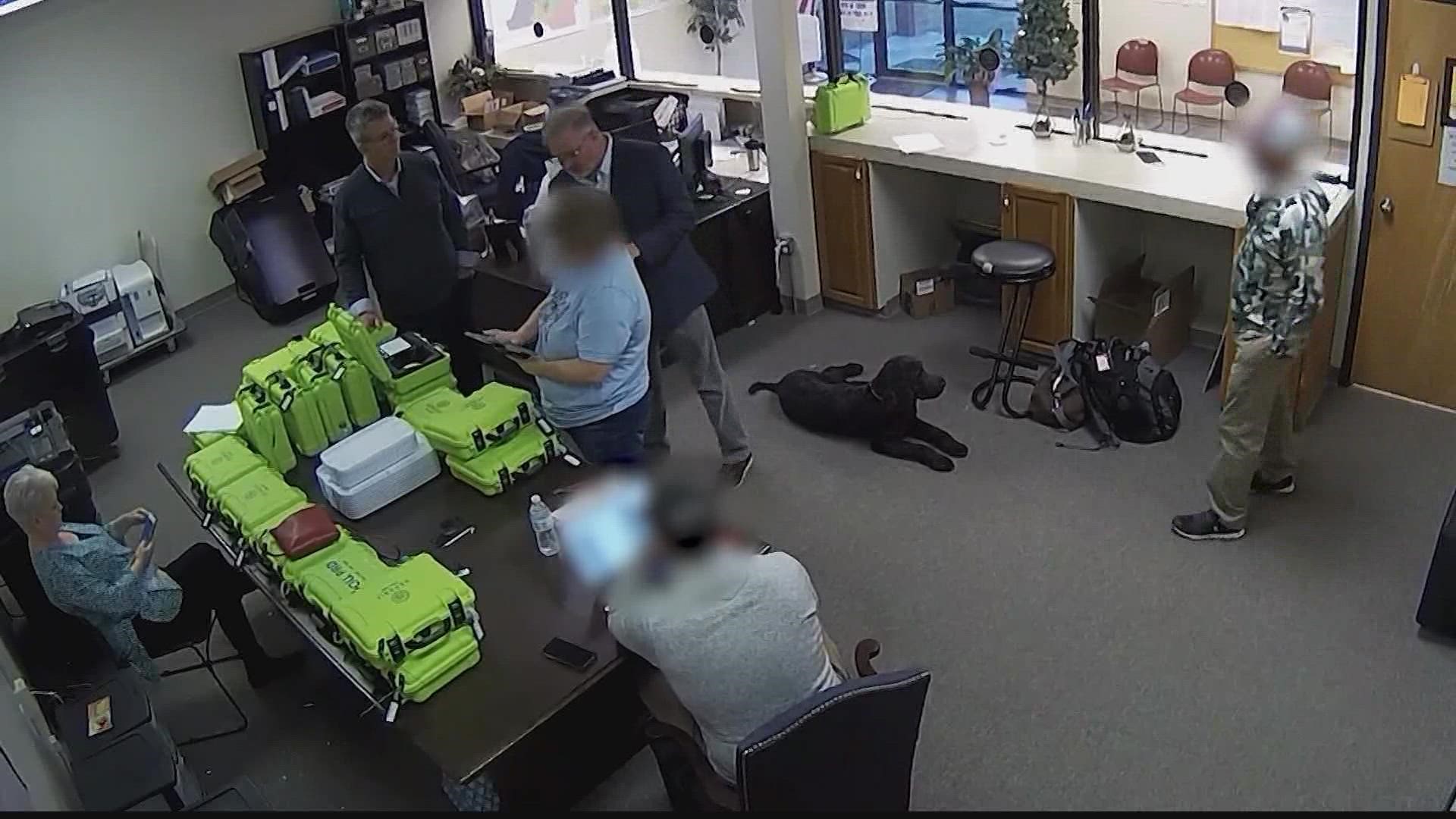COFFEE COUNTY, Ga. — A security video newly obtained by CNN and other outlets shows pro-Trump operatives inside the Coffee County elections office on the day they allegedly accessed and copied systems data from voting machines there.
The Coffee County episode has been described as a "trespass" of Georgia's election system by state officials, and the Secretary of State's Office has launched a criminal investigation into the incident.
The new video shows figures such as former Coffee County Republican Party chairwoman Cathy Lathum - whose attorneys said she "would not and has not knowingly been involved in any impropriety in any election" - sitting around as members of a computer forensics team work to access the voting systems data.
According to The New York Times, the forensics team can be seen in the video working around and handling state election system poll pads.
The poll pads are tablets which produce the voting cards people need to use to start the voting process, and state officials told The Times that the poll pads "have voter information but it's not accessible because it's scrambled behind security protocols."
The full scope of what information could have been accessible is not clear, though the state spokesman who spoke to The Times, Mike Hassinger, said it would not have included driver's license numbers or Social Security numbers.
The forensics team in Coffee County reportedly worked for Atlanta company SullivanStrickler, who were reportedly hired by Trump attorney Sidney Powell.
The video also shows pro-Trump activist and Atlanta area businessman Scott Hall, who has said in a recording filed as part of a lawsuit challenging the security of Georgia's election system that the team "went in there and imaged every hard drive of every piece of equipment."
“We basically had the entire elections committee there. And they said: ‘We give you permission. Go for it,'" Hall reportedly said.
Previously released video has shown Latham escorting people into the building the day of the breach.
The new video comes on the heels of a new filing in the long-running lawsuit over Georgia's election system - which seeks to compel the state to use paper ballots instead of Dominion voting machines. That lawsuit dates well before the 2020 election back to when Georgia first adopted the Dominion system.
According to the latest filing, Latham helped coordinate the arrival of the computer forensics team at the Coffee County elections office on Jan. 7, 2021, welcomed them upon arrival and spent nearly all day there instructing them what to copy. That turned out to be “virtually every component of the voting system,” the court filing says.
Robert Cheeley, an attorney for Latham, did not respond to an email seeking comment. He previously said his client doesn’t remember all the details of that day. But he said she “would not and has not knowingly been involved in any impropriety in any election” and “has not acted improperly or illegally.”
RELATED: Attorney weighs in on impact of new video showing fake Trump elector gave access to elections office
Latham also was one of 16 Georgia Republicans who submitted illegitimate Electoral College votes on behalf of Trump as his supporters worked to overturn his loss in 2020. She is attempting to quash subpoenas for her personal electronic devices, including any cellphones, computers and storage devices.
Those devices could hold data, according to the filing, that would likely "reveal additional details about the work performed and information obtained in the breach, what was done with the compromised software and data, and the people involved in planning and orchestrating the breach, which puts voters and future elections at enormous risk."
The new Coffee County security video, according to The Times, also shows investigators from the Georgia Secretary of State's Office present during the alleged breach. Hassinger told the paper he had "no idea" why they were there, and that "we are looking into it."
He added that Coffee County was being investigated by the state at the time because they had deliberately delayed certifying their election results in December.
The county was investigated for its handling of the recount process. Coffee election officials would not recertify their electronic recount results, claiming they could not duplicate the results credibly and that the state voting system was "not repeatable or dependable."
The state countered that they suspected the local election supervisor had simply scanned a batch of ballots twice and created a 50-vote discrepancy that she then wrongly attributed to a problem with the machines.

